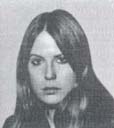Alison Devine
(1972, 74-77)

In my youthful obliviousness, I didn't realize that most new teachers flew in to Haneda, to be met, collected, and transported to the school. More than anything else, I wanted to see myself as a savvy and independent grown-up traveler, and anyway, no one had ever escorted me to a first day on the job before...Fortunately, Odawara Station had an English sign and a taxi stand, but the taxi driver there had no idea where I wanted to go. Finally, I gave him a school brochure that caused him to say "Ah-jia Sen-ta" several times... Then we were tearing up a hill, tooling down a long drive, and stopping at a door that would be my door for the next five years.
They were glad to see me. They had been a little anxious. Most of the other teachers were still on holiday they said. They showed me to a room where the futon was spread out with a yukata starched into a solid block lying on top of it in welcome. Phil was already back. (Or had he not gone away?) We went out for sushi and I gagged discretely on the octopus appetizer.
The others came in the next day, full of unfamiliar place names: Sendai, Mashiko, Kyoto, Izu-Hanto, and words in their English between Japanese and slang, like "dozo-box," "shinking," and "arbeito." They were from California and Ohio and Alberta and Los Angeles and Texas and Oklahoma. Jane was from London. They were very young, I thought, and very straight. I had a sinking feeling the second evening when I realized I had met all of them. Even then I knew they were going to be the only friends I would have while I was there.
Of course, there would be a whole new lot of teachers coming in just a few months later. There were the Harkers, staunch enthusiasts for whatever it was we were meant to be doing. There were Tone and Masumi (though we called him Takahashi-san then) and later Aladdin and Marco and Chirro the dog....There were the students, of course: earnest tooth sucking salarymen, who missed their rice and cheated on English Only, pretty girls whose weddings we were always invited to, and the guys from Nippon Bulge who waited faithfully Tuesday evenings for my taxi to traverse the paddies so they could have an hour's English conversation. The money was good. The work was not arduous, and I liked teaching and the luxury of living inside my head between two cultures and not belonging in either.
....In those days, we were much further from home than we would be if we were in Japan today. In five years, I think I spoke to my parents only once by phone. We wrote letters while we monitored language lab and looked for aerograms and parcels in the pigeonholes next to furonto. In retrospect, it was a good way to complete some kind of separation from the dependencies of childhood....
Mostly we studied. We dedicated our days and our selves to the naive and greedy acquisition of ikebana, karate, sumi-e, shakuhachi, cooking, and go. We watched: sumo, funerals, matsuri, and soap operas. We memorized awkward Japanese verb forms, idioms, greetings and slang. We went to public baths and religious ceremonies and fish markets and country potteries. We tried to connect. Eventually, we got apaatos, boyfriends, and the Lonely Planet Guide to Bali. Some of us left, for graduate school mostly, or other teaching jobs, or travel, or marriage, to be replaced by others with somewhat less sheltered backgrounds. The new batch included ex-Peace Corps, a few hippy-traveler types we had connected with on our holiday adventures, and people with relevant degrees in ESL and International Business. The transition from Up With People was complete without most of us ever knowing we had been part of it....
....It's hard to say from this vantage point whether spending our twenties in Japan made us the kind of fifty-year-olds we are now, or whether this was what we had planned to become all along, with Japan being simply a way to do it. Regardless, we didn't know what was happening or what we were doing. We didn't know what the decades after Japan would be like. We had no idea we would find ourselves so old.
Two years ago, I was giving a series of lectures on contemporary art in Tokyo, Yokohama and Kawasaki. It was my first time back in twenty-five years, and it smelled the same. I had tea at International House with Mr. Shibusawa and together we marveled at what a remarkable thing those years had been. I said "We had no idea how young we were," and Mr. Shibusawa laughed. "I knew," he whispered. "I knew."
Top |
Copyright (c) Language Institute of Japan (LIOJ) / 日本外語教育研究所 |  Back Back |